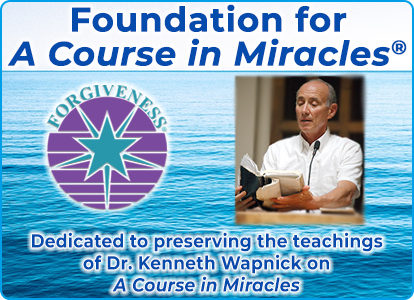
Click on an excerpt, audio or video tab to open.
Click on an excerpt, audio
or video tab to open.
Best Viewed in Landscape
Q: “If to love oneself is to heal oneself, those who are sick do not love themselves” (T-12.II.1:2-3). Does this make the person who loves himself a “special love” person?
A: No, it does not lead to special love. According to A Course in Miracles, both sickness and healing are exclusively in the mind; and sickness is an attack, a decision to reject the love in our right mind and identify instead with separation and guilt in our wrong mind, which we then project. To love yourself simply means to accept the truth about yourself, thus healing yourself of all false thoughts about who you are. In that state, you would not and could not attack yourself or anyone else. This is not special love because this right-minded self-love, by definition, includes everyone else as well. The love in our right minds is all-inclusive, unlike the special love made by the ego that excludes certain people or groups. This is a love that is really self-less; it is the stage of the journey that precedes our return to the perfect Oneness of God’s Love for His Son, and His Son’s for Him.
Excerpted from Q&A
VIDEO EXCERPT
Press play arrow to view.
Excerpted from “What It Says”: From the Preface of A Course in Miracles
One cannot be at peace in this world if one believes there is a world. Our belief that a world exists manifests on a practical level in thinking the world has an impact on us. Thus, we would typically believe that our happiness depends on circumstances outside us: our feeling good about ourselves, or feeling loved and accepted depends on other people acting a certain way or treating us as our specialness demands. What the world calls peace generally means the quiet we sometimes feel when our needs have been met; or being peaceful at a given moment because we paid our debts, and so people are no longer angry with us—we completed our parts in the special relationship bargain. This is not to say the bargain will not be broken in the next moment or hour, or the next day, week, month, or year. This is inevitable in the ego thought system, at which point we have to make additional bargains. Thus there can be no peace as long as we feel the world has power to affect us.
Specifically, we experience the reflection of God’s peace to the extent we are able to say that our happiness does not depend on anything external. The converse is also true. Our unhappiness, anxiety, depression, and guilt do not depend on anything external. Remember that in A Course in Miracles the body—ours or another’s—is outside the mind. Therefore, if we feel ill, it is not because we have caught a disease. Both happiness and unhappiness, a sense of well being and discomfort, come from the mind, having nothing whatsoever to do with the world. Understanding this, and then beginning the process of accepting its truth, leads to the peace of God.
The reflection of these statements—Nothing real can be threatened. Nothing unreal exists—is recognizing that since nothing external has power over our peace, we are upset only because our minds made a decision to be upset. We simply used the world and body—specifically the bodies of others—not only as a means of justifying our dis-ease, but blaming someone else for it. This is part of the ego’s plan to have us lose touch with the mind’s power, which means our original decision for the ego remains intact. This mistake can be undone only when we recognize there is a mind that has the power to choose, and we have chosen wrongly but can now choose again.
Excerpted from “What It Says”: From the Preface of A Course in Miracles

